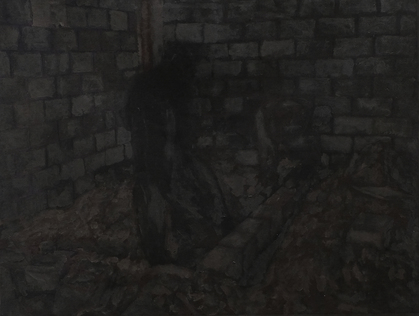-
From Current Issue
-
- Editor’s Letter Fire in the Heart
- Reviews I Gusti Ayu Kadek Murniasih
- Reviews 11th Seoul Mediacity Biennale: “One Escape at a Time”
- Dispatch Networked China
- One on One Monira Al Qadiri on Yukio Mishima
- Essays The rise of independent art spaces in pandemic-era Shanghai
- Features Tuan Andrew Nguyen
- Table of Contents
- Web Exclusives
- Archive
- Subscribe

R
E
V N
E
X
T
Installation view of MOHAMMED KAZEM’s “A Prime Activity” at Gallery Isabelle van den Eynde, Dubai, 2018. All images courtesy the artist and Gallery Isabelle van den Eynde, Dubai.
Dubai is a multivalent place. Despite its reputation as a luxury tourist destination, the port city has been a magnet for migrant workers for almost a century and a half. In the painting exhibition “A Prime Activity” at Gallery Isabelle van den Eynde, Mohammed Kazem celebrates this often unacknowledged side of Dubai, his home city, as well as encapsulating an important moment in his diverse and compelling practice.
Born and raised in Dubai, Kazem is an integral member of “The Group of Five,” an informal collective of artists widely recognized as the founders of the Emirati contemporary art scene. In the spirit of the group’s experimental methodology, Kazem’s practice is wide-ranging, spanning performance, photography, video art, installation, and painting. Yet “A Prime Activity” was an intimate and personal exhibition as Kazem paints, in ink, acrylic, and watercolor, his neighborhood through his eyes and his place within it, illuminating the everyday social life of the city of Dubai.
To the left of the entrance were five paintings of the inside of Kazem’s studio from the years 1993, 1998 and 1990. Rendered in a variety of vibrant and muted watercolor and acrylic hues, the works highlight the workmanship of the artist and his own activities as part of the urban economy—it is a craft and a process, existing in tandem with the milieu outside of his door.
Installation view of MOHAMMED KAZEM’s “A Prime Activity” at Gallery Isabelle van den Eynde, Dubai, 2018.
In the main space of the gallery, a series of 26 small watercolor portraits, collectively titled Neighbours (2018), were hung in two parallel horizontal rows. The portraits, painted in soft blues, purples, ochers, and greens, are silhouettes of crowds of people who Kazem encountered in his day-to-day life on the street or while waiting for public transportation. Painted on eggshell white paper, these abstract shadows do not possess any identifying elements, but in their grouping together evoke the multicultural, multi-faceted communities of Dubai, all of whom contribute greatly to the character of the city. In the back wall and rear section of the gallery, Kazem presented graphic compositions, also titled Neighbours (2018), of abstract architectural elements—sharply delineated saturated colors represent rooflines, corners, and walls where buildings and dwellings came together. The texture of the paint was rough and coarse, echoing the stucco style of Dubai’s architectural vernacular. Set against brilliant, deep-navy skies, these perspectives accentuate the mundane but important connections between places of the city, the focal point being the intimate spaces where people live and work.
The exhibition was anchored by a series of ten large acrylic paintings, “Even the Shade Does not Belong to Them” (2018), that synthesized the themes of the other works surrounding it. Mounted on the main wall, the works were inspired by Kazem’s photographs of street scenes. The canvases portraying blue-collar workers in Dubai are washed in dark ink, creating a visual distance between the viewer and the scene, as if one is looking out through the darkened window of a car driving on a city street, capturing glimpses into the lives of the people working in the city. The subtle hints of blue, representing construction uniforms, and gray, representing the shadows of the concrete city, are a moving and empathetic nod to the layered lives of the marginalized, whose stories are often hidden under the surface. In other paintings, Kazem depicts men standing on scaffolding, laying brick and plastering walls, as well as on their work break, chatting as they sit on a street corner and take refuge in the shade. They are shown on construction sites but also within their dwellings and in communal spaces, such as the yards between buildings, where men come together to rest after work. With this series, Kazem pays tribute to the myriad people who make up his neighborhood. Their activity helps to drive the development of the city, while his activity honors the people who are part of the process.
Mohammed Kazem’s “A Prime Activity” is on view at Gallery Isabelle van den Eynde, Dubai, until November 1, 2018.
To read more of ArtAsiaPacific’s articles, visit our Digital Library.









